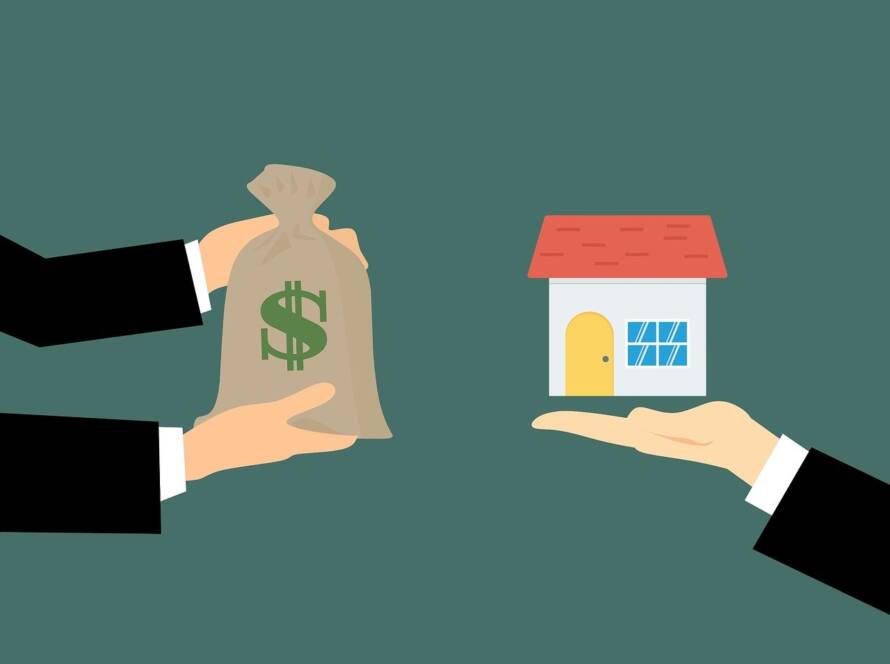What is a Reverse Mortgage?
Reverse mortgages are a type of loan for homeowners to borrow money from their home equity without needing to sell their home. It essentially converts a portion of your home equity into tax-free money, with the lender making payments to the borrower rather than the other way around. Unlike traditional mortgages, this is the only type of mortgage where you do not have to make any regular payments. The loan also does not have to be repaid until the borrower moves, sells the home, or passes away, making it a flexible financial solution.
How Does Reverse Mortgage Work in Canada?
You are most likely eligible to borrow up to 55% of the current value of your home in Canada through the reverse mortgage under certain criteria, which is listed below. The amount you can borrow depends on your age, your home’s condition, type of home (condo, semi-detached, townhouse, etc.), location of your home, and your lender. Calculators can be found online to find out how much you can borrow.
The Criteria:
- In Canada, a reverse mortgage can usually be done when you and everyone under your home’s title is 55 years of age or older (The higher the age is, more money can be borrowed).
- Must be using your primary residence as the home, meaning you must live in that home for at least 6 months of a year.
You can use the money you get from the reverse mortgage for anything you wish. Some popular examples of how most Canadians use the money they get are:
- Pay off any debts, especially with high interest rates
- Cover any health care expenses
- Home renovation
- To travel
- Help family and friends financially
- Get more income during retirement
- Many more!
Some things to keep in mind are that a reverse mortgage will not affect any OAS (Old Age Security) or GIS (Guaranteed Income Supplement) benefits you may be getting. The interest rate will also be higher than the interest rate for other mortgages and a home equity line of credit. You do have the option of repaying the loan in full at any time, however, depending on the contract, a fee may be applied if the reverse mortgage is paid off early. All existing loans and mortgages under the home property must be paid off as well.
What is the Difference between Reverse Mortgages and Other Ways of Borrowing?
Reverse mortgages may be more worth it if you’re older as it’s less of a financial burden for you and has many benefits. You are not required to pay periodically or give any regular payments while you are living in the house compared to other types of mortgages. You aren’t required to give proof of income or a down payment.
What Companies Do Reverse Mortgages?
For those wondering whether banks like TD Canada, Scotiabank, Royal Bank of Canada, or CIBC provide reverse mortgages, there are only two banks currently handling these mortgages. Although, if you are considering applying for it in Canada, please visit your local bank branch, as they will redirect you to one of the major reverse mortgage companies. CHIP by HomeEquity Bank has referral relationships with all major Canadian banks. Resulting in direct contact with a representative through your local bank. Equitable Bank is the other major bank.
CHIP Reverse Mortgage by HomeEquity Bank is the popular option currently in Canada as the reverse mortgage market reached high numbers in recent years. HomeEquity qualifications include the mandatory criteria mentioned above, being 55 years or older including your spouse if you have one, must be a Canadian homeowner, and minimum appraised value of home should be $250,000. The location of the home, type of home, condition of the home, and the amount of home equity will also be part of consideration and the mortgage will be dependent on these factors.
Equitable Bank also has reverse mortgages available. When HomeEquity was the only option for reverse mortgages, Equitable Bank started in 2018 with lower rates for this program. Their qualifications are based on the mandatory criteria mentioned above, type of property you have, location of the property, and the borrower’s age. The minimum age to apply with Equitable Bank is 55, with the property being valued more that $250,000, and an individual must borrow a minimum of $25,000. Regardless, Equitable Bank only lends to borrowers from urban centers in the provinces of Alberta, Quebec, Ontario, and British Columbia.
Alternative Reverse Mortgage Company
For years, HomeEquity and Equitable Bank has been the only reverse mortgage lender causing the interest rate to be higher than most lending programs, however, a recently established financial institution might change that. Another company that does reverse mortgages in Canada is Bloom.
Bloom operates to help Canadian seniors save during retirement to love the life you have planned. For a reverse mortgage, you must be 55+ in age, live in Ontario, Alberta, or British Columbia, and the home you use must be principal residence. What makes Bloom unique is their transparency towards reverse mortgages, with the combination of online calculator tools and the traditional process of applying for a reverse mortgage.
How to Start a Reverse Mortgage?
To start the process, start off by looking at reverse mortgage companies and deciding which one you would like to work with. Then fill out an application online through those companies like CHIP or Equitable Bank. The application may require you to provide information about you and your financial stats for a better estimate. Once this is done, you will receive an estimate of the amount you are eligible to borrow.
A representative from the lender you applied to will reach out to you to discuss anything related to the reverse mortgage, financial situations, and answer any questions you may have. After the application is reviewed, the lender will help finalize your reverse mortgage starting process. You can choose to receive the money as a recurring payment, ad-hoc payment, or even a one-time disbursement. Check in with your lender for additional information on how to receive the money.
Reverse Mortgage Repayment (After Death?)
Reverse mortgages don’t have regular payments. Therefore, you also don’t have to repay anything that you get from the mortgage unless in the case of:
- Sale of the Home: The loan becomes due when the home is sold. The proceeds from the sale are used to repay the mortgage, with any excess going to the homeowner or their estate.
- Permanent Move: If the homeowner moves out of the home permanently (e.g., into a long-term care facility), the loan must be repaid.
- Death of the Borrower: Upon the death of the borrower (or the last surviving borrower if there are multiple), the loan is repaid using the sale of the home. If the heirs wish to keep the property, they must repay the loan balance.
The Pros & Cons of a Reverse Mortgage
There are both benefits and drawbacks to consider when seeking a CHIP mortgage. Before deciding on getting a reverse mortgage, it’s important to thoroughly review and understand both its advantages and disadvantages. Being informed and prepared for what comes ahead will help you make a more knowledgeable educated decision and see if it fits your best interest or not.
The Benefits
- No Required Repayment: Not Required to make regular or immediate mortgage payments with this loan, as you have the flexibility to use or deposit the amount that suits you reasonably.
- Home Ownership: Able to maintain ownership of your home and it will not be taken by the bank. You may also use the home as down payment for a second house.
Consequences
- High Rates: Overall higher rates compared to other types of loans and mortgages, due to the lack of competing banks.
- Minimum Borrowed Money: Burrowing a certain minimum, even if that much money is not required for the property.
- Equity Reduction: Home equity will reduce as there isn’t any interest while taking this mortgage.
- Inheritance Decrease: Related to your wills assets, anyone benefiting from your inheritance after death will receive a smaller amount of valuables due to any remaining loan repayments. Some of the property will be sold to cover the loan payment, or the beneficiaries repays the loan to receive the inheritance.
The Importance of Reverse Mortgage Lawyers
Usually, real estate lawyers assist clients with reverse mortgages. They help by managing the legal aspects of setting up the mortgage and make sure that your rights as an individual are protected. They handle them similar to almost any other type of real estate transaction like guiding you through the paperwork and legal requirements so they can make sure that everything goes smoothly.
The costs can be higher due to the elevated interest rates that are charged, but a reverse mortgage lawyer will ensure the most practical and most financially sound reverse mortgage for you. Additionally, you’re required to pay the lenders legal fees as they have processed your mortgage along with your lawyers legal fees as they have provided you with legal advice and support for your mortgage transac
Frequently Asked Questions
What are the specific requirements to be able to get a reverse mortgage in Ontario?
- You must be 55 years of age or older
- Must use your primary residence as the home you’re getting the mortgage on
When do I have to repay the balance?
- When you choose to sell your home,
- When your choose to move out of your home,
- Or if the last borrower dies
Am I able to use the mortgage to pay for any home renovations or other expenses I may have?
The amount that you receive from a CHIP mortgage can be used for renovations that are required for you to live a comfortable life. For example: expanding doorways, adding stair lifts or elevators, entrance ramps etc. They may also be used while you pay for any in house health care support.
Am I allowed to repay the loan early?
Yes, however depending on your lender and situation, there may be fees applied.
Do I have to pay tax over the money received?
No, usually you are not required to pay tax over the money received from a CHIP mortgage.
What will happen if my home values decrease in Ontario?
If the value of your home decreases below the balance owed on the reverse mortgage, you can still live in the house for the rest of your life. You also will not be required to pay more than what you paid to purchase the house.
How / Where can I find a good reverse mortgage lawyer in Ontario?
The best reverse mortgage company in all of Canada is Home Equity bank. Although looking for a good mortgage lawyer, it is best that you research real estate law firms that have reputable reviews online and see if they meet the requirements for your case by checking their online websites or by reading other clients’ reviews on them. It is crucial to recognize that a “good” lawyer form isn’t the best for all clients. Find one that represents you!!
Check out how KN LAW can represent you with your mortgage-related inquiries.
What will happen if I choose to move out of the home that I took a reverse mortgage out from?
You will be required to pay back the balance and sell/move out of the home.
What costs are included in reverse mortgages fees in Ontario?
Reverse mortgages fees include an appraisal fee, legal fees and an administrative fee.
Are there any provincial regulations or protections for reverse mortgages that are specific to Ontario?
Yes, there’s some provincial consumer protection laws that are used to protect the borrowers, like how you must get legal advice before you choose to sign a reverse mortgage agreement.
The information contained in this blog post is provided for general informational purposes only. It is not intended to constitute legal advice, financial advice, tax advice, or real estate advice. Readers are advised to seek specific advice from a qualified professional in the relevant field. KN LAW expressly disclaims any and all liability with respect to actions taken or not taken based on the contents of this blog post. For personalized advice pertaining to your individual circumstances, please consult with our lawyer or the appropriate professional advisor. Get a free consultation here.

Works Cited
Alcaraz, Charlize. “Bloom raises $7 million to make applying for reverse mortgages easier.” BetaKit, 17 May 2021, https://betakit.com/bloom-raises-7-million-to-make-applying-for-reverse-mortgages-easier. Accessed 07 August 2024.
“Apply for a Reverse Mortgage in Canada.” Bloom Finance, https://www.bloomfin.ca/reverse-mortgage. Accessed 6 August 2024.
Elliott, Lucas. “Reverse Mortgage: What It Is and How It Works.” Money.ca, 30 April 2024, https://money.ca/mortgages/homebuying/how-a-reverse-mortgage-works-in-canada. Accessed 6 August 2024.
“How Do Reverse Mortgages Work in Canada | HomeEquity Bank.” CHIP Reverse Mortgage, https://www.chip.ca/how-reverse-mortgage-works/. Accessed 6 August 2024.
MacGregor, Sandra, et al. “Guide to Getting a Reverse Mortgage in Ontario.” NerdWallet, 8 September 2023, https://www.nerdwallet.com/ca/mortgages/reverse-mortgage-ontario. Accessed 6 August 2024.
“Reverse mortgages.” Canada.ca, 29 November 2023, https://www.canada.ca/en/financial-consumer-agency/services/mortgages/reverse-mortgages.html. Accessed 6 August 2024.
“Reverse Mortgages.” Equitable Bank, https://www.equitablebank.ca/reverse-mortgage?q=eligibility. Accessed 6 August 2024.
“Reverse Mortgages | How It Works and Rates.” WOWA.ca, 14 August 2023, https://wowa.ca/reverse-mortgage. Accessed 6 August 2024.
Singh, Ajay. “Which Lenders Offer Reverse Mortgages in Canada? | RetireBetter.” Reverse Mortgage, 3 August 2023, https://retirebetter.ca/blog/which-lenders-offer-reverse-mortgages-in-canada. Accessed 6 August 2024.


